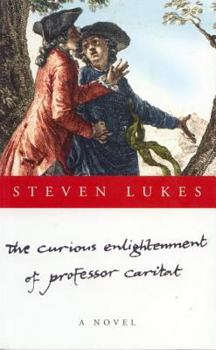The Curious Enlightenment of Professor Caritat: A Comedy of Ideas
Select Format
Select Condition 
Book Overview
A whirlwind tour through the utopias of modernity The Curious Enlightenment of Professor Caritat is a brilliant fictional excursion through Western political philosophy from one of our most original... This description may be from another edition of this product.
Format:Paperback
Language:English
ISBN:1859840736
ISBN13:9781859840733
Release Date:November 1996
Publisher:Verso
Length:272 Pages
Weight:0.85 lbs.
Dimensions:0.8" x 5.3" x 8.5"
Customer Reviews
5 ratings
A fluently written and enjoyable satire
Published by Thriftbooks.com User , 15 years ago
Professor Caritat (named after the surname of the Optimistic philosopher better known to us as the Marquis de Condorcet), a specialist on the thinkers of the Enlightenment, is a cross between a sophisticated Candide and a Gulliver. He is a citizen of Militaria, a repressive state run by a military dictatorship. He has to flee from that and embarks on a mission to find a state in which the ideas of 18th century philosophers have been applied and to see how these ideas have turned out in practice. He is looking for the best of all possible states. But in each of these countries he gets into trouble, wittily described, and has to move on. The first country he visits is Utilitaria, which is governed by the ideas of Jeremy Bentham; and a soulless place it is, where there is no place for anything that cannot be proved to be `useful' to its society. The next country is Communitaria. Its government is committed to total respect and equal treatment for every ethnic and every religious community, but it interprets respect in such a way that any comment which might suggest that one way of living or one set of ideas is superior to another, and every criticism of any group, is severely punished, so it is in effect an extremely intolerant state. From there Caritat escapes to Proletaria - named, he is told, after the class that had brought it into being, although that class, like all others, has since withered away, as indeed has the state itself. This turns out to be a phantasmagoria, from which he awakes to find himself in yet another country, Libertaria. Here free enterprise is rampant, every public service is in the process of being privatized, financial extortion is the name of the game, and woe betide those who can't play it. The country seems to be an ally of Militaria: though Libertarian `freedom' is missing there, Militaria's maintenance of `order' is something the Libertarians admire. Finally, on his way out of that country, the Professor makes it to Minerva, a border town in the North of Libertaria. There he comes to the wise conclusion that what was the matter with all the dystopian states he had visited was that the single-minded pursuit of just one desirable aim (Order, Welfare, Respect, Equality, Freedom of Action) leads to the suppression of all the others. Condorcet had observed that all human ideals are linked together in an indissoluble chain. More practically, Isaiah Berlin (whom Lukes does not name in the text, though he does mention him in the bibliography) has taught that there needs to be a trade-off between all these desirable aims. How to strike this balance must be a never-ending quest, requiring much Wisdom. One of his interlocutors in Libertaria had told him that people once believed that there was a state called Egalitaria north of their country, but that they had found that it did not exist and was in fact a utopia. Perhaps that is the reason why the book ends in Minerva, with Caritat seeing that
the curious enlightenment of professor caritat
Published by Thriftbooks.com User , 24 years ago
As a sociology major, and having to read 24 other books this past semester, I was blown away at this novel. Lukes did such an excellent job at capturing the spirit of the enlightenment with Caritat's character. As Nicholas searched for the perfect society the reader struggles with him, hoping to find a perfect place. While the ending is a little predictable, I could never bear to put it down, and was so delighted to experience Professor Caritat's journey towards finding the perfect society!
It's Rare You Find Something This Good
Published by Thriftbooks.com User , 25 years ago
I'm very happy to have read this book and probably will again. It's humorous, critical, reflective and gives a very entertaining perspective on Utopian Philosophies and what they value. I'd reccomend it to almost anyone interested in political theory and philosophy that enjoys a good satire.
It's a book with a touch of both imagination and reality.
Published by Thriftbooks.com User , 25 years ago
Any people can read this exciting book-- with or without interest in philosophy. Steven Lukes has the talent to make the readers feel the wonders of imagination, to escape the reality for awhile. At the same time, Lukes makes the readers learn the reality of the different societies we live in. The book is filled with ideas that let us judge whether a perfect world really exists or not.
funny, moving and thoughtful, worth rereading umpteen times
Published by Thriftbooks.com User , 26 years ago
It's a fictional critical comments on major schoold of political philosophies in the West at the end of the second millennium AD from the stand point of good, old Enlightenment. I fell in love with it with my first reading, have translated and published it in Thai last year, and used it to teach my political philosophy courses with great success and general enjoyment of the students. I learn more with each time that I reread it for my classes. Strongly recommended for anyone bored with theory and philosophy. It will change your intellectual life !






